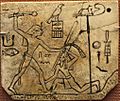Wepwawet facts for kids
Wepwawet was an important god in ancient Egyptian mythology. His name means "opener of the ways." He was often shown as a wolf. People believed he helped clear paths for armies and guided the spirits of the dead. His main worship place was a city called Asyut in Upper Egypt.
Contents
Wepwawet: The Opener of Ways
Who Was Wepwawet?
Wepwawet was first known as a god of war. He was very important in the city of Asyut. This city was a special place where people worshipped him. Wepwawet's name, "opener of the ways," tells us a lot about his role. He was seen as someone who cleared paths.
Wepwawet's Appearance
Wepwawet was usually shown as a wolf. Sometimes, he appeared as a man with a wolf's head. He was often seen standing at the front of a solar boat. This boat was believed to carry the sun god across the sky. Being at the front meant he was guiding the way.
Wepwawet's Role in War
In ancient Egypt, Wepwawet was like a scout for the army. People believed he went ahead of soldiers. He would "open the way" by clearing paths and making sure the army could move forward safely. An old writing from the Sinai desert says Wepwawet helped King Sekhemkhet win battles. He was a symbol of victory and protection in war.
Wepwawet and the Afterlife
Over time, Wepwawet's role grew. Because he "opened the way" for armies, people also thought he could open paths for the dead. They believed he guided spirits through the Duat. The Duat was the underworld, a journey the dead had to make. Wepwawet helped spirits find their way safely to the afterlife.
Images for kids
-
A statue of Wepwawet from 664–332 BC, found at the Brooklyn Museum.
See also
 In Spanish: Upuaut para niños
In Spanish: Upuaut para niños
 | Shirley Ann Jackson |
 | Garett Morgan |
 | J. Ernest Wilkins Jr. |
 | Elijah McCoy |



